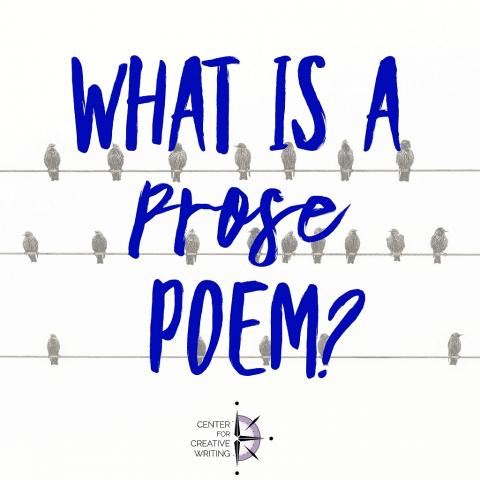
Last month, I recommended some books to kick off your new year. One of them was Partial Genius, by Mary Biddinger. This book is a collection of prose poems, which might be an unfamiliar format for many readers.
What is a prose poem?
The prose poem form actually began in Japan in the 17th century, is evident in the work of French writers in the mid-1800’s, and regained popularity with the Beat Poets in the 1950’s and ‘60’s. Its most distinctive trait is that there are no line breaks; a prose poem looks like a prose paragraph.
The main elements of poetry, however, remain central to the crafting of these pieces. Prose poems include metaphor, imagery, repetition, figures of speech, and internal rhyme schemes. Prose poems do not necessarily contain elements of fiction, such as plot, inciting incident, character arcs, climaxes, or falling action.
Let’s take a quick look at a fun example.
Examples of prose poems
“Be Drunk,” by Charles Baudelaire (1821-1867)
You have to be always drunk. That’s all there is to it—it’s the only way. So as not to feel the horrible burden of time that breaks your back and bends you to the earth, you have to be continually drunk.
But on what? Wine, poetry or virtue, as you wish. But be drunk…
Read the rest of the poem at Poets.org.
As we can see, though this piece is in paragraph form, it is more a commentary on the human condition than a story. In the first paragraph, we have the image of backs being bent over and the beautiful alliteration of the “b” sound. In the third paragraph we have the quick repetition of nouns and the phrase “everything that is…” to create an impatient, almost ecstatic tone.
On the other hand, there is no plot or character development in this piece. There are no elements of fiction utilized here, but there are many poetic elements. The only thing missing is line breaks.
Why break from line breaks?
Why would poets choose to abandon line breaks, you might ask? Why not just write prose instead?
Well, besides the previously mentioned differences between poetry and prose, authors might choose the prose poem format if the introduction of line breaks changes the tone of the poem to something overly wrought or dramatic. The prose poem relies on the integrity of the sentence to convey the tone and the author may not want the added tension or layered meanings a line break introduces.
A prose poetry writing exercise
Find a favorite poem, either a famous example or one you’ve written yourself. Write it out with no line breaks, in sentence form.
Let’s use a famous Dickinson stanza as an example:
I'm Nobody! Who are you?
Are you – Nobody – too?
Then there's a pair of us!
Don't tell! they'd advertise – you know!
Would become:
I’m Nobody! Who are you? Are you—Nobody
—too? Then there’s a pair of us! Don’t tell! They’d advertise—you know!
Look at the two examples, the poem version and the prose version, and consider which one you like better, and why. Does the pace of the poem change when you read it as sentences? Do the words that end the lines with breaks seem to carry more weight and power—do they get lost in the sentence versions? If you read them aloud, does one version sound different from the other? Can you see how line breaks in the first version bring a kind of drama and attention to the Nobody, despite her efforts to remain anonymous, and how that contrast creates a tension that fuels the poem?
Take the line or sentence that most interests you and make it the first line of a new prose poem. Try to focus more on imagery, metaphor, and language than plot or characters. In other words, show us an emotional state, rather than tell us a story with a beginning, middle, and end.
What do you think of prose poems? Will you try this writing exercise? Share with us in the comments.
Related reading: Read more in 2022: 4 genres, 4 book recs
Writing in pieces: In defense of fragments over finished products
Want to receive tips and inspiration like this in your inbox every Sunday morning? Join our email list community! You will receive weekly advice, a year’s worth of weekly writing prompts as a FREE download, and be eligible to participate in our monthly photo prompt contest for a chance to share an original piece of writing with our community of nearly 2,000 writers.
